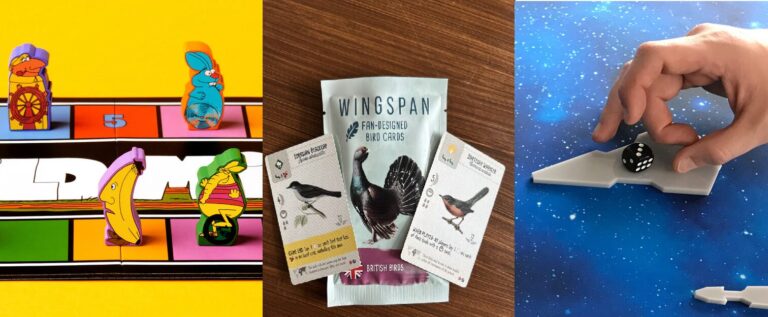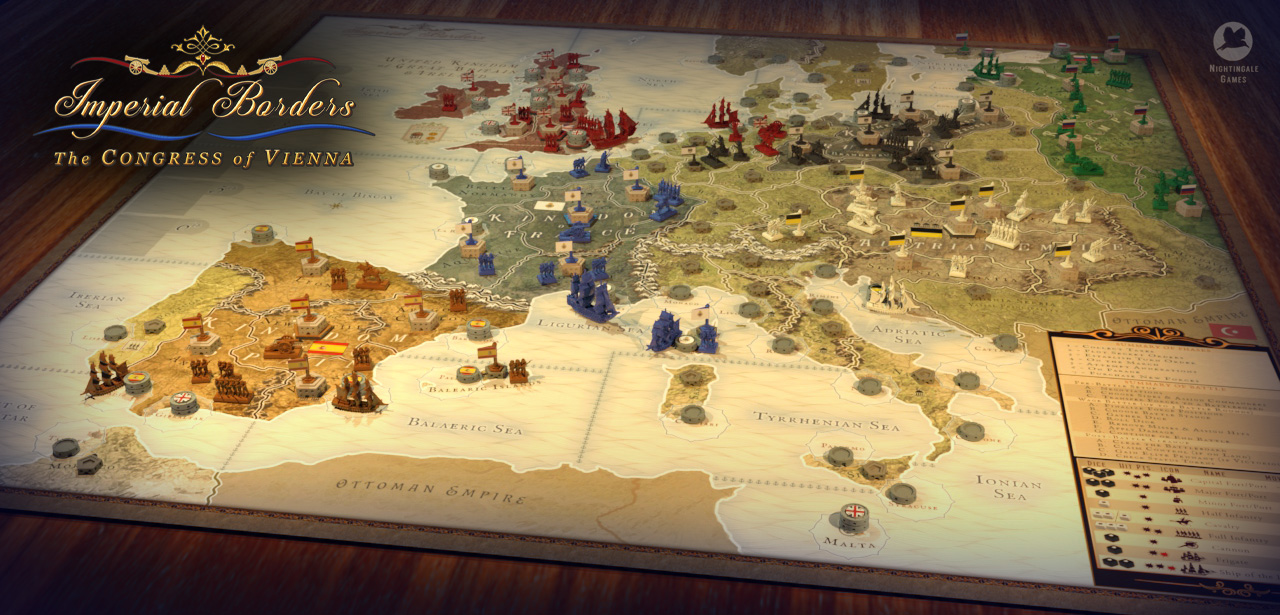
Spinning plates: How a one-person publisher is bringing Imperial Borders, the latest giant game from legendary Axis & Allies designer Larry Harris, to the table [sponsored]
Bringing any board game crowdfunding project to fruition amid the clamour of competiting offerings can be a challenge for even large publishers. But doing so as a one-person company, putting out the latest expansive board game from famed Axis & Allies designer Larry Harris, requires another level of plate-spinning entirely. In this sponsored article, Nightingale Games owner Thomas Gale talks deluxification of Kickstarters, savvy advertising and working in the post-Covid environment, while Larry Harris himself discusses his design approach and creating ‘experiences’ rather than just games.
Imperial Borders has already raised more than $350,000, with 18 days of the campaign still to go – please click here to visit the Kickstarter page.
BoardGameWire: Imperial Borders is a vast product – a huge map, almost 300 miniatures, and a host of other components. Was that an intentional decision, to help the game stand out on Kickstarter?

Thomas Gale, owner of Nightingale Games: Larry’s been making epic oversize games since the beginning of his career. The big box Milton Bradley series from the early ‘80s had three of Larry’s games: Axis & Allies, Broadsides & Boarding Parties, and Conquest of The Empire. So I suppose not much has changed from his point of view. As far as standing out on Kickstarter, that can be very tricky these days given the increasing numbers of game titles, even for gigantic ones, like ours.
What’s your take on the ‘deluxification’ of tabletop games, and where does Imperial Borders fit into that niche?
‘Deluxification’ has definitely been a growing trend over the past decade. We do try to brand ourselves in the high-end tier… as a kind of ‘Rolls Royce’ of board games, but that doesn’t sit so well with those who only have so much disposable income. By the way, I looked up how much a 2023 Rolls Royce Spectre costs… $422,750! Ack! [spits out Cognac!]. Yes, I can certainly feel the repercussions of cutting out a huge swath of customers once you shoot for the moon with increased grandeur and quality. However, there is definite value. We don’t jerk up the price just to seem luxurious… actually, it’s almost the opposite for us. We have to bottom line our margins to reach as wide an audience as possible. In short, if I were in it for the money, I’m in the wroooong industry.
Larry is obviously most famous for Axis and Allies, which has a large ‘casual gamer’ fan base – is Imperial Borders aimed at a similar crowd, or is there also plenty here for more hardcore gamers?
Larry’s games have fit in a nice middle-of-the road spot of not being to hardcore and not being too simplistic. However, trying to please both ends of the spectrum is like being pulled apart by horses (or so it seems sometimes). One would think striving for a middle road in terms of complexity would be easy. Not so. We were at PAX East and ended up surrounded by mostly video game booths. We kind of stuck out as an oddity. “Casual” gamers in cosplay outfits approached and asked us if this was like Risk. I would bite my tongue… and say “Um, yesss, yes it is.” Then, the odd war game grognard would come up and ask us why we aren’t doing such and such, which is a valid question, but the answer is… we don’t want to go that deep. So in short, Imperial Borders will appeal to everyone! Yay!
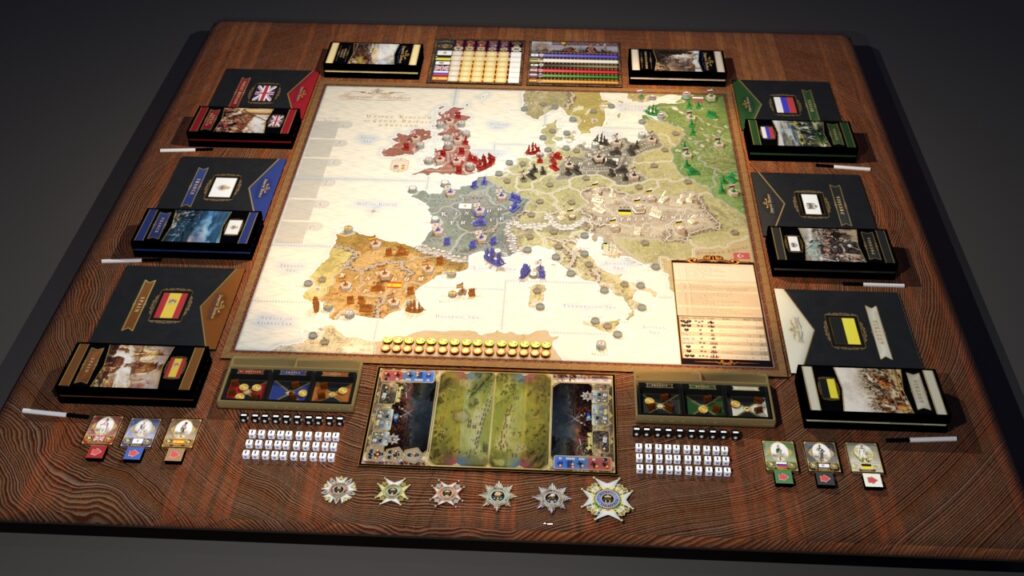
Nightingale Games already has two successful crowdfunding campaigns under its belt for Larry Harris’ War Room – how has the crowdfunding environment changed since?
This being my third Kickstarter, I don’t quite feel like an expert. But I would say the biggest trends are a sense of wariness among the jaded and experienced crowdfunders mixed with waves and waves of naive newcomers. If you look on YouTube, you can learn about how this or that big name company failed or scammed tons of people big time and not just because of COVID. A lot of the problems arise when companies run multiple projects overlapping, funding one to pay for another. It’s good that Gamefound (which I haven’t tried yet) is around to offer some competition for Kickstarter. I notice Kickstarter has made an effort to improve their services, presumably, in response. Similar to the growing problems with mainstream media, it seems ours is the Age of Misinformation. Be skeptical when viewing self-professed YouTube experts touting their “wisdom” of whether or not to back this or that project. A humble few of them do their homework, but others are downright sloppy. As far as reliable information, there have always been scammers through history but now there seems to be a particularly steep decline of trusted sources.
Those two War Room campaigns fell either side of the Covid pandemic. How did the pandemic and lockdowns affect Nightingale, and are there still hangovers from it regarding manufacturing and shipping board games?
It was rough. Our shipping container prices were $25,000 instead of $5,000. We hit the peak pricing perfectly. There was also a delay in game development because getting together to test was much trickier, even with online options. The traffic jams in port… ugh. It was all a horrible chain reaction. But we survived. Today, getting industry news from China can be murky, like reading tea leaves. The price fluctuations of materials and the logistics of migrant factory employees can be mind-boggling. Fortunately, our manufacturer is GPI (based in Massachusetts) and they’ve had 20+ year relationships with their primary factory partners in China from what they tell me… everyone wants stability. By the way, I’m told the cost to print in the USA would be 3 to 4x comparatively. I wonder if that will eventually drop given the demand and the political climate.
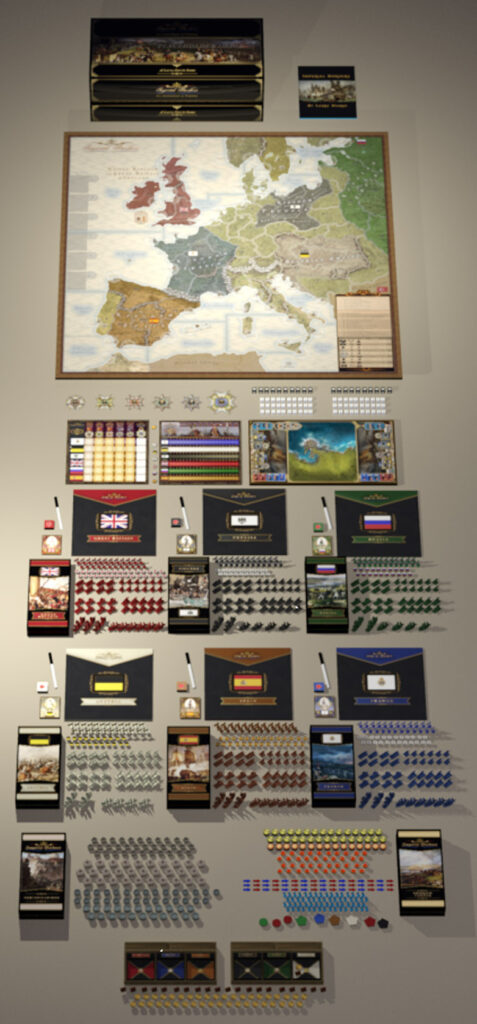
It seems like you wear a lot of hats at Nightingale, which is just you and two designers as the core team. How do you handle keeping so many plates spinning, running a Kickstarter as such a small operation?
Well, if I start to make any money then I might have a problem. I kind of like not having the responsibility of employees and I don’t personally have grand ambitions. I just want to be creative, so as far as spinning plates… I think that ends up being a piece of cake with lots of practice. But add in a few too many plates and then… well… you drop the plates. I’ve seen some friends get really burned out in the computer game dev industry (as that is my background). After 25 years you learn to properly pace yourself. You can also play mind games. For example, I like to trick myself into believing washing dishes is a nice, fun zen break from work.
How important is delegating out aspects of the Kickstarters process, to freelancers and service companies, and which are you using for Imperial Borders?
It’s very important. But I’m also a bit of a control freak when it comes to areas I’ve worked in all my life, like art graphics and writing. The less I am capable of a certain type of task, the easier it is to delegate. I find that working with people you know and trust as friends works well. We’ve used George Ledoux as VO for our Kickstarters multiple times, because he’s got talent and he’s a nice guy. Same goes for Kevin Chapman, our fantastic rulebook editor. Our gang of repeat testers are awesome! That sounds like a plug (and it is). Same goes with our shipping warehouse hubs. It takes some time to develop trust, but you know it when you’ve got a good thing going. I feel lucky in that regard. However, the bigger the company, the harder it is to develop a trusting working relationship. I’m tempted to badmouth a few very big companies that I’ve used in the past, but I won’t.
BoardGameGeek and Facebook ads have been the go-to places for promoting board games online in recent years – is that changing any time soon?
They are good resources. But I definitely feel constrained. I started investigating ads on Roku, but haven’t gotten very far. Seems promising. I saw a poll somewhere that said advertising in print media is inconsequential, but I wonder. I feel like an ad for Imperial Borders in a War History magazine would be fantastically efficient. By the way, I will badmouth Meta. Land Sakes! I’ve been bombarded with scammers, phishers, and solicitors with poor communication skills non-stop, even long before our Kickstarter launch. I feel that Meta has the power to diminish this problem but tries to ignore it. It will bite them, when more and more people do find other avenues for advertising.
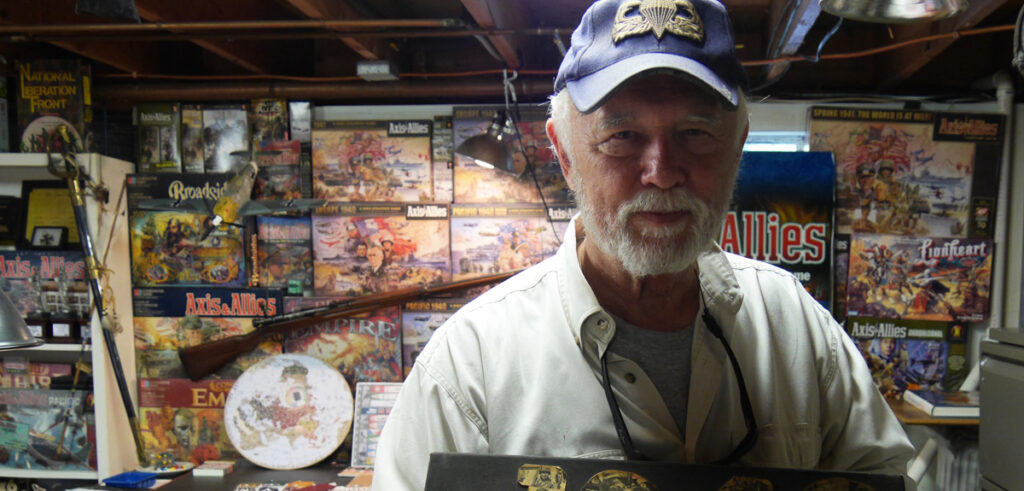
Turning to you Larry: Axis and Allies, War Room, and now Imperial Borders are all games with massive scope. How do you go about starting to design such an expansive board game?
Larry Harris: Designing an expansive board game starts with a clear vision of the historical period or theme I want to capture. For Axis & Allies, it was easy… I was driven by my personal connection to World War II through my father. When it came to War Room and Imperial Borders, I had the opportunity to link up with a young man who not only shared my interest but could tolerate my insanity. Not only that, but he was also a hell of a lot smarter than me – we should all be so lucky. Tom and I both got totally into the strategic depth and complexity of the global conflict of that monumental human milestone… World War II. As for Imperial Borders, it’s really simple… I always wanted to do that game. I begin by extensively researching the historical context, then distilling key elements into game mechanics that provide a good narrative and fun. I focus on creating a harmony between strategic depth and the future player I have in mind. I strive to ensure the game has a great narrative, respects history, and yet is playable. Prototyping and playtesting are crucial stages where the game evolves based on feedback and iterative improvements. Tom and I thrive on that process.
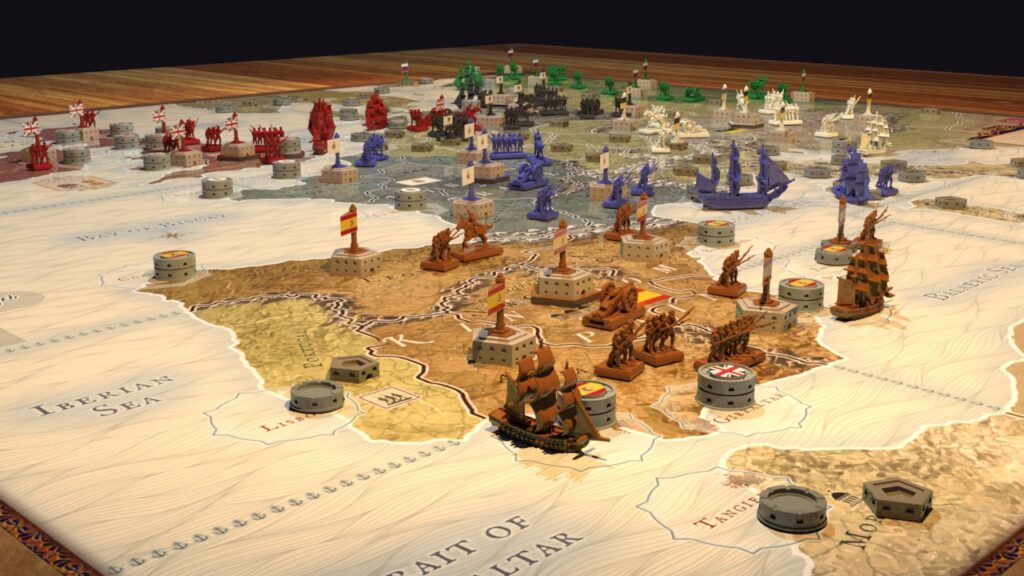
Board game design has exploded in all sorts of directions since you began in the late 1970s – are there any core design tenets that have remained consistent in that time?
Absolutely. Some core tenets that have remained consistent include the importance of balance, the necessity of clear and concise rules, and the value of player interaction. A well-balanced game ensures that no single strategy dominates, keeping the game exciting, fair, and the ability to merge history and game mechanics in the right portions. Clear rules are essential to prevent confusion and disputes during gameplay. Finally, player interaction is a key element that makes board games social and engaging, whether through direct conflict, negotiation, or cooperation.
How do you think your games stand apart from others on the market? Are you chiefly designing for yourself when you make a game, or do you have a particular type of gamer in mind?
My games stand apart due to their historical depth, strategic complexity, and large-scale scope, yet they remain simple to play. They are designed to provide an immersive experience that transports players to significant historical periods. In Imperial Borders, for example, you can earn well-deserved medals. If you want to immerse yourself, Nightingale Games will go there with you. I pretty much only design games that I’m interested in and enjoy getting into. At times that personal interest is just enough fuel to keep me pushing. I want to share these interests with history buffs and gamer/simulators who enjoy deep, strategic gameplay and want to venture into what it must have been like to be a soldier in the front rank of an advancing 19th-century infantry column. There are times when I feel like I’m not designing a game but rather creating an experience. I aim to offer something unique and engaging that can take as long to make as it needs and stands the test of time.
Of your many designs over your long career, which do you think is the most underrated, and deserves more love from players, and why?
I have a propensity to always be totally caught up in the project I’m working on at the moment. Imperial Borders is no exception. Add to that, I’ve always wanted to create a game based on this time and place. If I were to highlight a deserving “underrated game,” I’d have to say it is my latest creation, Imperial Borders. “I say this because I know how good this game is, even though the gaming community hasn’t realized it yet.”. That’s the definition of being underrated. So, I guess my most underrated game that deserves more love from players is Imperial Borders.





